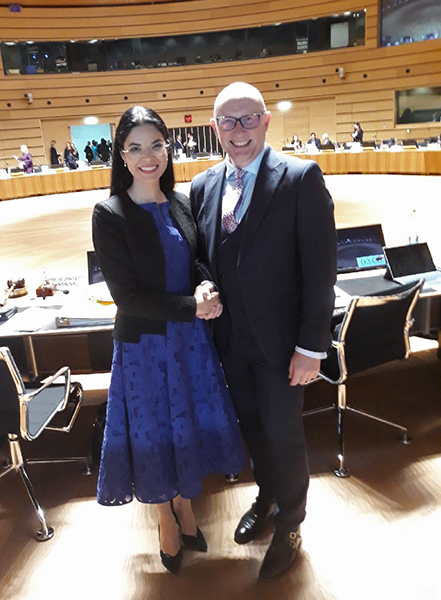Mr Klaus Meyer-Cabri, Vice-President of Eurojust, participated in the Justice and Home Affairs Council in Luxembourg to contribute to the discussions on future developments in the fight against cross-border crime.
'Without cross-border cooperation between prosecutors, the EU security chain would be incomplete and therefore weak. The support of the Ministers of Justice to the work of Eurojust and the networks is hence extremely encouraging in this respect', stated Mr Meyer-Cabri.
The Council dealt with several aspects of judicial cooperation in the European Union.
Firstly, the European Union set up several networks of practitioners (European Judicial Network (EJN), JITs Network, Genocide Network, European Judicial Cybercrime Network (EJCN)), and tasked Eurojust to host and support their Secretariats. To avoid duplicates, it is crucial to ensure synergies between Eurojust and the networks established in the area of judicial cooperation in criminal matters. 'This is an integral part of our mandate and we can see that synergies between Eurojust and the networks are already effective', said Mr Meyer-Cabri. To date, this has proved to be a win-win situation: hosting the networks enhances Eurojust's expertise in judicial cooperation matters or in specific crime areas (e.g. cybercrime, international core crimes) and strengthens its ties with judicial authorities.
Secondly, the Ministers discussed the future of mutual recognition in criminal matters and acknowledged the key role played by Eurojust, along with the EJN, in this field. Through intermediation, Eurojust helps practitioners to find their way in an increasingly complex EU legal environment and ensures that they have the latest information at hand.
 For instance, in the last days, Eurojust assisted public prosecutors in assessing and mitigating the impact on the ongoing European Arrest Warrant (EAW) proceedings, following the rulings of the ECJ of 27 May 2019 that concern the status of public prosecutors as issuing authorities under the EAW Framework Decision.
For instance, in the last days, Eurojust assisted public prosecutors in assessing and mitigating the impact on the ongoing European Arrest Warrant (EAW) proceedings, following the rulings of the ECJ of 27 May 2019 that concern the status of public prosecutors as issuing authorities under the EAW Framework Decision.
However, Eurojust also underlined that judicial cooperation needs appropriate funding. Therefore, important political choices will have to be made in the context of the discussions on the Multi-Annual Financial Framework 2021-2027: reduce the effectiveness of judicial cooperation, merely keep the current level, or further increase the effectiveness of judicial cooperation.
'The future of law enforcement should not be seen in isolation: the actions of law enforcement need to be followed by effective prosecutions, which requires appropriate financial resources', concluded Mr Meyer-Cabri.
Mr Klaus Meyer-Cabri meeting with Ms Ana Birchall, interim Minister of Justice of Romania, at today's Justice and Home Affairs Council. Photo © Eurojust.
